Augusta, Georgia Blood Testing Facilities
 Represents a LabCorp blood testing facility
Represents a LabCorp blood testing facility Represents a Quest Diagnostics blood testing facility
Represents a Quest Diagnostics blood testing facility

Nearby Labcorp Blood Testing facilities:
- Labcorp Center Distance: 7 m, 1219 West Wheeler Pkwy Suite D, Augusta, Richmond County, GA, 30909
- Labcorp Center Distance: 10 m, 425 N. Belair Rd Suite 2, Evans, Columbia County, GA, 30809
- Labcorp Center Distance: 12 m, 430 Society Hill Drive, Aiken, Aiken County, SC, 29803
- Labcorp Center Distance: 13 m, 410 University Pkwy Ste 1500B, Aiken, Aiken County, SC, 29801
- Labcorp Center Distance: 48 m, 120 Gordon St, Washington, Wilkes County, GA, 30673
- Labcorp Center Distance: 50 m, 1111 Edgefield Street, Greenwood, Greenwood County, SC, 29646
- Labcorp Center Distance: 53 m, 215 Mims Rd, Sylvania, Screven County, GA, 30467
- Labcorp Center Distance: 55 m, Highway 278, Fairfax, Other, SC, 29827
- Labcorp Center Distance: 58 m, 610 Sparta Rd, Sandersville, Washington County, GA, 31082
- Labcorp Center Distance: 60 m, 2669 Kinard St, Newberry, Newberry County, SC, 29108
- Labcorp Center Distance: 61 m, 1 Wellness Blvd Ste 105, Irmo, Lexington County, SC, 29063
- Labcorp Center Distance: 64 m, 116 Stagecoach Ln, Orangeburg, Orangeburg County, SC, 29118
- Labcorp Center Distance: 65 m, 2100 Gervais St Ste B, Columbia, Richland County, SC, 29204
- Labcorp Center Distance: 72 m, 101 Lake Oconee Park, Eatonton, Greene County, GA, 31024
- Labcorp Center Distance: 73 m, 120 Highland Ctr Dr Ste 130B, Columbia, Richland County, SC, 29203
- Labcorp Center Distance: 84 m, 501 Robertson Blvd, Walterboro, Colleton County, SC, 29488
- Labcorp Center Distance: 89 m, 1000 Hawthorne Ave Ste D, Athens, Clarke County, GA, 30606
- Labcorp Center Distance: 95 m, 1350 Haile St, Camden, Kershaw County, SC, 29020
- Labcorp Center Distance: 96 m, 144 Garrett St Ste B, Sumter, Sumter County, SC, 29150
- Labcorp Center Distance: 97 m, 135 Commonwealth Dr Ste 150, Greenville, Greenville County, SC, 29615
- Labcorp Center Distance: 98 m, 25 Woods Lake Rd Ste 222, Greenville, Greenville County, SC, 29607
Nearby Quest Blood Testing facilities:
- Quest Center Distance: 7 m, 1109 Medical Center Drive, Augusta, Richmond County, GA, 30909-6647
- Quest Center Distance: 66 m, 3010 Farrow Rd, Columbia, Richland County, SC, 29203-7603
- Quest Center Distance: 74 m, 1601 Fair Rd, Statesboro, Bulloch County, GA, 30458-0801
- Quest Center Distance: 89 m, 1000 Hawthorne Ave Ste Q, Athens, Clarke County, GA, 30606-2168
- Quest Center Distance: 91 m, 512 Maple Dr, Vidalia, Toombs County, GA, 30474-8912
- Quest Center Distance: 96 m, 430 Roper Mountain Road, Greenville, Greenville County, SC, 29615-4243
Augusta Georgia Hormone Replacement Therapy Services
Hormone Deficiency can have potentially debilitating effects upon one's health if left unchecked for years. Two of the most common and most devastating forms of Hormone Imbalance are Low-T and Human Growth Hormone Deficiency. Testosterone is the key to man's physiological wellness, and Healthy HGH Levels keep the physiological systems and processes which support overall wellness functioning at their optimal capacity.
Hormone Deficiency is an Age-Related Health Issue
When these Hormone Levels fall into decline, it can lead to serious issues for patients, which impede health and reduce a patient's ability to live life as he or she chooses. Beyond the age of thirty, your risk for symptomatic Hormone Deficiency increases with every passing year, due to unfortunate changes in Hormone Production that are directly correlated with age.
Augusta HRT Treatments for Hormone Restoration
Fortunately for you, there are treatments available that are 100% proven to restore waning HGH and Testosterone Levels back to a functional normal. This is achieved through Hormone Replacement Therapy, and the Conscious Evolution Institute can help. We are a fully licensed and board-certified HRT Clinic that is happy to serve the patients of the Augusta Georgia area, and we also offer our services nationwide to patients in need and in distress. We have Hormone Experts with years of experience in treating various forms of Hormone Imbalance and Deficiency, and we are notable for our fast-and-accurate diagnoses and our affordable rates for Physician-Monitored Testosterone and HGH Therapy.
Contact us Today for HGH and Testosterone Prescriptions in Augusta Georgia!
If you feel that you or someone that you care about may be suffering from the effects of Andropause or Somatopause, we strongly urge you to take the time to reach out to one of our friendly Hormone Doctors or HRT Specialists. We have our phone number at the top of the page, and you also have the option to fill out the form on this page to arrange for further contact.
Augusta Georgia HGH Injection Treatments
Human Growth Hormone Therapy is taking the world by storm. HGH Deficiency is a major medical malady that alters wellness and leads to increased mortality risk and lower quality of life. With Bio-Identical Human Growth Hormone Therapy, it is possible to therapeautically boost HGH Levels back to the point of optimal functionality, allowing the body to recover from the various symptoms associated with diminished HGH Production.
Human Growth Hormone is delivered via subcutaneous injection on a daily basis, and, especially when mixed with healthy exercise and diet, has been shown to vastly improve wellness markers for patients that stick to the treatment for six months or more. If you've been suffering from signs of HGH Deficiency such as fatigue, excessive illness, slow healing, depression, unhealthy changes in body composition, or trouble sleeping, you may be a candidate for this potentially life-altering medical treatment. Our HGH Clinic is there for the residents of Augusta Georgia.
Augusta Georgia Sermorelin Acetate for Natural Growth Hormone Restoration
Of course, it's wonderful to have alternatives available, especially when it comes to something as important as facilitating good health. That's why we also offer Recombinant Sermorelin Therapy to our patients. Sermorelin is clinically tested and shown to be equally effective as HGH Jobs of achieving the goal of Hormone Restoration for the vast majority of men and women diagnosed with Age-Associated Hypopituitarism.
There are even appear to be some advantages that Sermorelin has over Growth Hormone for many patients. For example, Sermorelin is allows the body to make its own HGH, more accurately preserving the delicate Hypothalamic-Pituitary Axis responsible for Hormone Balance. Furthermore, Sermorelin is less expensive, and your Hormone Physician has the legal right to provide Sermorelin for off-label use if he or she deems the treatment beneficial to you, the patient.
Augusta Georgia Bio-Identical Testosterone Therapy for Age-Related Low-T
Testosterone Deficiency is another form of Hormone Imbalance that has a stark and ever-worsening impact on male health. Low-T is very common in the United States today, and millions have benefited from Testosterone Injections, Low-T Creams, and other forms of Hypogonadism Treatment. The most recognizable symptoms of Testosterone Deficiency are associated with sexuality: Low Libido and Erectile Dysfunction.
If this weren't reason enough to turn to Andropause Therapy, there are even more symptoms, that not only impact your happiness and your romantic relationships, but also your appearance, your overall health, and your longevity. Men with Low Testosterone Levels are more likely to be anxious and lack confidence. They are more likely to suffer from life-threatening heart and cardiovascular conditions, and are more likely to be obese, lack energy, and suffer from low energy. If you think that Low-T may be the cause of your sorrows, we can send quality Prescription Testosterone Products directly to your home for affordable prices.
Augusta Georgia Information
The city of Augusta Georgia is located in the northeastern portion of the state, and sits on the border with South Carolina, separated by the Augusta river. The city itself is the deepest point on the river which can be travelled easily by ship. Behind Atlanta, Augusta is the most populous metro area in all of Georgia. Inside the state, suburbs of Augusta include Evans, Grovetown, Wrens, Keysville, and Waynesboro. In South Carolina, suburbs are Beech Island, Jackson, Spiderweb, North Augusta, and Belvedere. The PGA Master's Tournament is held annually in Augusta, and is the most well-known fact about the city. The city was founded in the year 1736 by British general James Oglethorpe, who also founded Savannah. Today, Fort Oglethorpe Georgia is named after the General.
About Augusta Georgia
Augusta is referred to as the Garden City, because of the beautiful landscaping, parks, and gardens that dot the city, and Augusta is recognized nationwide for its wonderful scenery. Parks in Augusta include Pendleton King Park, Phinizy Swamp Nature Park, and Riverwalk Augusta. Among the prominent neighborhoods in Augusta are Highland Park, Pepperidge, National Hills, Lakemont, Forest Hills, Lake Aumand, and Montclair.
Some of the most famous people to live in Augusta were Woodrow Wilson, Hulk Hogan, Amy Grant, and James Brown, who had a bronze statue erected in Downtown Augusta.
Jobs and Employment Opportunities in Augusta Georgia
Augusta has benefited greatly from government jobs, and one of the most prominent employers in the city is For Gordon, which is the home of the United States Army Cyber Command. The University Hospital of Augusta University is the keystone of the medical science job market in Augusta, which employs over 25,000 men and women in the region. With regard to private employment, some of the biggest job-creators in Augusta are FPL Flood, Kellogg's, International Paper, and Textron Specialized Vehicles.
All About Augusta, Georgia Geographic Area
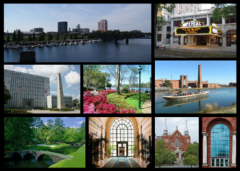

Augusta is a consolidated city in the U.S. state of Georgia, located at the fall line of the Savannah River, at the head of its navigable portion. As of the 2010 census, the Augusta aeRichmond County population was 195,844 not counting the unconsolidated cities of Hephzibah and Blythe.
Augusta is the principal city of the Augusta ae Richmond County Metropolitan Statistical Area, which as of 2010 had an estimated population of 556,877, making it both the second-largest city and the second-largest metro area in the state after Atlanta. It is the 116th-largest city in the United States. Internationally, Augusta is best known for hosting The Masters Tournament in golf each spring.
The area along the river was long inhabited by varying cultures of indigenous peoples, who relied on the river for fish, water and transportation. The site of Augusta was used by Native Americans as a place to cross the Savannah River, because of its location on the fall line.
In 1735, two years after James Oglethorpe founded Savannah, he sent a detachment of troops to explore up the Savannah River. He gave them an order to build at the head of the navigable part of the river. The expedition was led by Noble Jones, who created the settlement to provide a first line of defense for coastal areas against potential Spanish or French invasion from the interior. Oglethorpe named the town Augusta, in honor of Princess Augusta, wife of Frederick, Prince of Wales and mother of the future King George III of the United Kingdom. Augusta was the second state capital of Georgia from 1785 until 1795 (alternating for a period with Savannah, the first).
It was in the area of Georgia developed as the Black Belt, for large cotton plantations, after the invention of the cotton gin made use of short-staple cotton more profitable. The commodity crops were worked by enslaved Africans, many brought from the Low Country, where the Gullah culture had developed on its large Sea Island cotton and rice plantations.
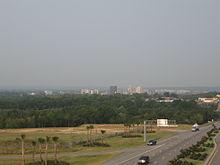
Augusta is located on the Georgia/South Carolina border, about 150 miles (240 km) east of Atlanta and 70 miles (110 km) west of Columbia. The city is located at 33 °28 a²12 a³N 81 °58 a²30 a³W / 33.47 °N 81.975 °W / 33.47; -81.975 (33.470, na81.975).
According to the United States Census Bureau, the Augusta-Richmond County balance has a total area of 306.5 square miles (793.8 km2). 302.1 square miles (782.4 km2) of it is land and 4.3 square miles (11.1 km2) of it (1.42%) is water.
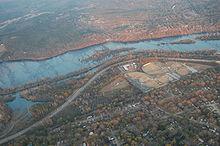
Augusta is located about halfway up the Savannah River on the fall line, which creates a number of small falls on the river. The city marks the end of a navigable waterway for the river and the entry to the Georgia Piedmont area.
The Clarks Hill Dam is built on the fall line near Augusta, forming Clarks Hill Lake. Further downstream, near the border of Columbia County, is the Stevens Creek Dam, which generates hydroelectric power. Further downstream is the Augusta Diversion Dam, which marks the beginning of the Augusta Canal and channels Savannah River waters into the canal.
According to Koppen classification, Augusta has a humid subtropical climate. The city experiences short winters and an extremely humid summer. The average high temperature for the summer months is 90.6 °F (32.6 °C). Summer daytime temperatures can soar to 100 or above. The average low temperature is 67.8 °F (19.9 °C). The average high temperature for the winter months is 58.9 °F (14.9 °C); the average low temperature is 34.4 °F (1.3 °C).
Snowfall is not nearly as common as in Atlanta, due largely to Augusta's elevation, with downtown Augusta being about 900 feet lower than downtown Atlanta. Still, snow flurries are typically seen annually. Freezing rain is also a threat in wintertime.
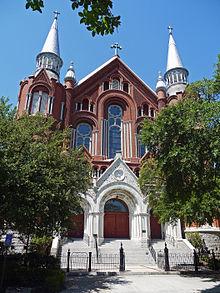
Augusta Downtown Historic District is a historic district that encompasses most of downtown Augusta and its pre-Civil War area. It was listed on the National Register of Historic Places in 2004.
Augusta also includes the:
As of the 2010 census, Augusta aeRichmond County had 195,844 residents. The population density was 816 people per square mile (1313/km ²). There were 84,427 housing units at an average density of 279.5 per square mile (782/km ²). The racial makeup of the city-county area was 54.7% Black or African American, 39.1% White, 0.3% Native American, 1.7% Asian, 0.2% Pacific Islander, 1.3% some other race, and 2.6% from two or more races. Hispanic or Latino of any race were 4.1% of the population.
There were 75,208 households, out of which 28.0% had children under the age of 18 living with them, 35.2% were headed by married couples living together, 22.7% had a female householder with no husband present, and 37.1% were non-families. 30.7% of all households were made up of individuals and 8.8% had someone living alone who was 65 years of age or older. The average household size was 2.46 and the average family size was 3.09.
In the city-county consolidated area the population was spread out with 24.6% under the age of 18, 12.6% from 18 to 24, 26.7% from 25 to 44, 24.8% from 45 to 64, and 11.3% who were 65 years of age or older. The median age was 33.0 years. For every 100 females there were 93.8 males. For every 100 females age 18 and over, there were 90.7 males.
As of the 2000 census, the median income for a household in the city-county area was $37,231, and the median income for a family was $45,372. Males had a median income of $32,008 versus $23,988 for females. The per capita income for the balance was $19,558. About 13.2% of families and 16.8% of the population were below the poverty line, including 24.1% of those under age 18 and 12.5% of those age 65 or over.
Augusta is a regional center of medicine, biotechnology, and military. Georgia Health Sciences University, the state's only public health sciences graduate university, employs over 7,000 people. Along with University Hospital, the Medical District of Augusta employs over 25,000 people and has an economic impact of over $1.8 billion.
Along with Georgia Health Sciences University, the city's three largest employers include the Savannah River Site (a Department of Energy nuclear facility) and the U.S. Army Signal Center at Fort Gordon. Despite layoffs from several companies during the U.S. economic recession and a relatively high state unemployment rate, the Augusta Community has experienced a decrease in bankruptcy filings and saw a slight decrease in the unemployment rate from late 2009 to March 2011. However, these unemployment numbers are misleading as Spring brings lower unemployment rates due to the Augusta Masters. While unemployment fell to a two year low of 8.3% in April 2011, unemployment rates have since risen back to 9.9% as of July 2011 because employers refuse to hire new fully qualified employees.
Companies that have facilities, headquarters or distribution centers in Augusta include CareSouth, T-Mobile, Solo Cup Company, Automatic Data Processing, International Paper, NutraSweet, Teleperformance, Sitel Corporation, E-Z-GO, Elanco, Club Car (Worldwide Headquarters), John Deere, Procter & Gamble, Kellogg's and Delta Air Lines baggage call center.
Augusta is home to the Augusta Greenjackets minor league baseball club. The team began play in 1988 as the Augusta Pirates, affiliated with the Pittsburgh Pirates. Later affiliated with the Boston Red Sox, the Greenjackets are with the San Francisco Giants. The team is owned by Cal Ripken Jr.
The city's ECHL hockey team, the Augusta Lynx, disbanded in December 2008.
The Southern Professional Hockey League would expand to Augusta starting in the 2010 ae2011 season. The Augusta Riverhawks was the winning name of the new team, the result of a "Name the Team" contest announced on March 13, 2010.
The Augusta Rugby Football Club (ARFC) is a division 2 men's club competing in the Palmetto Rugby Union, part of the USA Rugby South Conference.
Augusta also has its own all female flat track roller derby team, The Soul City Sirens. Founded in 2008, this league is all volunteer and skater owned.

The city aos famous golf course, the Augusta National Golf Club, hosts the first major golf tournament of each year, The Masters. This tournament is one of the most prestigious in the sport and is one of the four major championships. The best professional and amateur golfers in the world come to Augusta during the first full week of April every year. The grounds of Augusta National are known for being pristine, and the course was ranked in 2009 as the 3rd best golf course in the world by Golf Magazine.
The city also has disc golf facilities. The Augusta Top Gun Series is a series of tournaments sanctioned by the Professional Disc Golf Association. These tournaments are held at various venues in Augusta, including Pendleton King Park and Lake Olmstead. Also, Augusta hosted the 2006 Professional Disc Golf World Championships. Along with Pendleton King and Lake Olmstead, two courses in N. Augusta, SC were used for the tournament. 299 disc golfers from around the world attended the event, with Ken Climo winning the tournament and his 12th world championship.
Augusta is the host of the World's Richest Drag Boat Race, held on the Savannah River (Augusta Southern Nationals). The race is part of the IHBA Lucas Oil Drag Boat Racing Series and is sanctioned by the International Hot Boat Association (held on July 18 ae20). The event benefits the Augusta Chapter of the Georgia Special Olympics. Over 100 racing teams from 25 states will compete for $140,000 in purse and prizes as they try to beat the record of 252.94 MPH in the adWorld aos Richest Drag Boat Race au.
In 1995, citizens of Augusta and unincorporated Richmond County voted to consolidate their city and county governments. Citizens of Hephzibah and Blythe, also located in Richmond County, voted against joining in the consolidation of Augusta and Richmond County. Augusta and Richmond County's consolidation took effect January 1, 1996. The consolidated government consists of a mayor and 10 commissioners. Eight commissioners represent specific districts, while the other two represent super districts that represent half of the county's population respectively.
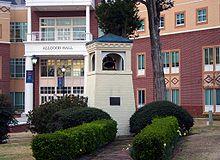
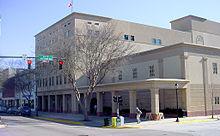
Public K ae12 schools in Augusta are managed by the Richmond County School System. The system has eight high schools, 10 middle schools, 36 elementary schools, and four magnet schools, ae including C. T. Walker Traditional Magnet School, A. R. Johnson Health Science and Engineering Magnet High School, and Davidson Fine Arts.
Private schools in Augusta include Aquinas High School, Episcopal Day School, St. Mary on the Hill School, Immaculate Conception School, Hillcrest Baptist Church School, Curtis Baptist High School, Gracewood Baptist First Academy, Alleluia Community School, New Life Christian Academy, and Westminster Schools of Augusta. Augusta Christian School, Augusta First Seventh-day Adventist School, and Augusta Preparatory Day School serve Augusta, but are located in neighboring Martinez, Georgia.
Augusta is linked to Atlanta to the west and Columbia, South Carolina, to the east by Interstate 20. Interstate 520 (Bobby Jones Expressway) runs from I-20 Exit 196 through Augusta's western and southern suburban areas, eventually crossing the Savannah River to South Carolina where it becomes the Palmetto Parkway.
U.S. and state routes:
Parts of Augusta are served by city transit service Augusta Public Transit (APT), but the main mode of transportation within the city is by car. The city has two airports: Augusta Regional Airport and Daniel Field Airport. Augusta is also served by a number of taxi companies.
Word Count: 2941





